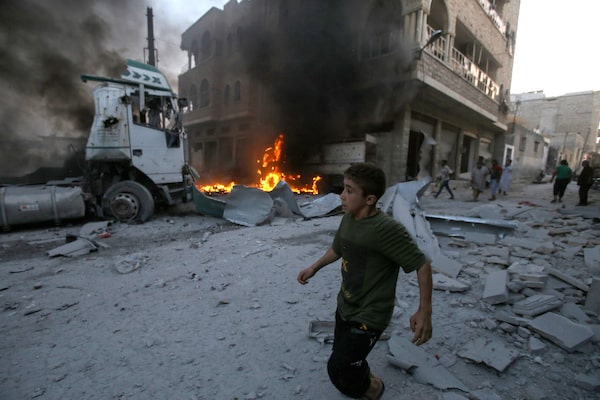
Six men, nine women and 18 Canadian children are currently trapped in Kurdish-run camps and prisons in northeastern Syria.ABDULAZEZ KETAZ/AFP/Getty Images
The RCMP say they have not sent investigators into Syria where Canadians alleged to have joined the Islamic State are trapped in camps and prisons, a measure that one security expert says would be an important step in gathering evidence to build a case for prosecution.
The federal government has faced pressure to repatriate Canadians who travelled to Syria to join the Islamic State, with calls in particular to help their children, who are also living in the camps. Questions about government action increased last week after Britain stripped Canadian citizen Jack Letts, a former dual national currently being held in a Kurdish-run jail in Syria, of his British citizenship.
Ottawa has maintained that it is too dangerous to send consular officials to northeastern Syria. Public Safety Minister Ralph Goodale has said investigating, charging and prosecuting Canadians involved in terrorism is the government’s priority, but has also acknowledged that it is hard to find evidence from a foreign war zone that will stick in Canadian courts.
Phil Gurski, a former analyst at the Canadian Security Intelligence Service (CSIS), said he is surprised that RCMP officers are not on the ground, but acknowledged some challenges they face.
“I think these guys should be sentenced for what they did,” he said. "If [RCMP officers are] going to be able to do that, you got to have access to evidence.”
Mr. Gurski said he would be surprised if an investigation isn’t under way in Canada, and added that information could be enough to launch a prosecution.
But, he said, it is hard to work in that region and gather evidence because of the continuing war, which would put RCMP members at risk.
There are 33 Canadians – six men, nine women and 18 children – trapped in Kurdish-run camps and prisons in northeastern Syria, according to Amarnath Amarasingam, an assistant professor at Queen’s University who researches extremism.
While the RCMP confirmed that officers are not on the ground in Syria, they would not comment on whether there is an investigation under way in Canada. But family members of those who have travelled abroad have said that they have been interviewed by both RCMP and CSIS agents.
“Given the public discussion under way on this issue, we will confirm that the RCMP has not sent investigators into Syria. Beyond that, the RCMP will not comment on deployment into specific countries,” Staff Sergeant Tania Vaughan said.
Meanwhile, Global Affairs Canada has indicated there are plans under way to identify Canadians who are living in the camps.
“Canadian diplomats have established a communications channel with local Kurdish authorities in order to verify the whereabouts of some Canadian citizens,” said Guillaume Berube, a spokesman for Global Affairs Canada.
Prof. Amarasingam, who is in contact with family members in Canada, said his impression is that relatives of Canadians who travelled abroad have been contacted.
“Especially recently, the RCMP seems to be going around visiting families, and asking questions about why people left and whether they’ve been in communication from the camps,” he said.
John Townsend, the head of media relations at CSIS, said the security and intelligence service “does not specifically comment on questions regarding operational interests, methodologies or activities – including interviews.”
But family members who have reported being visited by officers are under the impression they are collecting evidence, Prof. Amarasingam said, adding that he doesn’t know a parent who hasn’t been in constant communication with CSIS since their child left for overseas.
“For families, it’s also a way to keep tabs on what’s happening with their children.”
 Janice Dickson
Janice Dickson